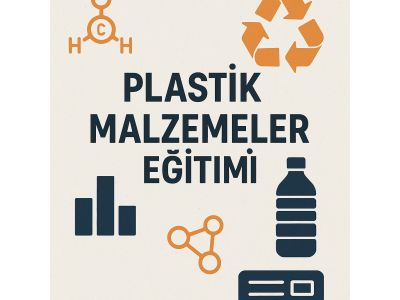This training covers the definition, classification, physical and chemical properties, and production methods of plastic materials in detail. Topics such as the differences between amorphous and crystalline structures, thermoplastics and thermosets, natural and synthetic polymers are explained in a simple and understandable language. At the end of the training, participants will reach a level of knowledge that enables them to make technical evaluations in plastic material selection and contribute consciously to production processes. It is especially prepared for those working in engineering, quality control, production, and product development fields.
- Polymers, polymer chemistry, and basic concepts
- Introduction to polymers, definitions, and general concepts
- Polymer chemistry
- Molecular weight, polymerization, and degree of polymerization
- Classification of plastics
- Natural and synthetic polymers
- Amorphous, semi-crystalline, and crystalline polymers
- Effects of amorphous and semi-crystalline structures on material properties (mechanical, thermal, optical, chemical, etc.)
- Homopolymers, copolymers, terpolymers
- Thermoplastics, thermosets, and rubbers
- Glass transition temperature, melting temperature
- Advantages and disadvantages of plastics compared to other traditional materials
Additives in Polymers and Their Effects
- Reinforcing additives added to plastics (glass fiber, carbon fiber, aramid fiber, natural fiber, etc.)
- Mineral additives added to plastics (calcite, glass beads, kaolin, talc, wollastonite, mica, barite, glass spheres, graphite, etc.)
- Effects of additives and fillers on mechanical, thermal, optical, electrical, processing properties of plastics
- Other additives added to plastics (antioxidants, UV stabilizers, heat stabilizers, flame retardants, colorants, antistatic agents, lubricants, processing aids, foam agents, etc.)
- Rules to consider when selecting additives
Polymer Materials and Their Types
Commodity Plastics,
- Polyethylenes: LDPE, LLDPE, HDPE, MDPE, UHMWPE
- Polypropylene (PP) and PP copolymer
- Crystal polystyrene (PS), Impact-resistant PS (HIPS)
- Polyvinyl chloride (PVC), Rigid PVC, Flexible PVC
Engineering Plastics
- Polyamides (Nylons): PA6, PA66, PA46, PA6.10, PA6.12, etc.
- Acrylonitrile butadiene styrenes (ABS)
- Polyoxymethylene (POM)
- Polycarbonates (PC)
- Acrylics (PMMA)
- Polyesters (PET, PBT)
- Styrenics (ASA, SAN)
- High-Performance Plastics
- Polyimides (PI)
- Polyamide-imides (PAI)
- Polyetherimides (PEI)
- Polyphenylene sulfide (PPS)
- Polysulfone (PSU)
- Polyether ether ketone (PEEK)
- Industrial application areas of plastics
- Polymer blends: PC/PBT, ABS/PC, ABS, PA6, PBT/SAN, PC/SAN, etc.
- Impact resistance, toughening, and brittleness reduction of plastics
- Plastic material selection and basic criteria
Testing Methods Applied to Plastics and Plastic Identification
- Tensile tests applied to plastics
- Sample standards, test conditions
- Tensile strength
- Yield strength
- Elastic modulus
- Percentage elongation
- Toughness
- Brittle fracture, ductile fracture
- Impact tests
- Sample dimensioning and standards
- Izod, Charpy impact tests
- Impact energy
- Impact strength
- Impact transition temperature
- Hardness tests
- Shore A, Shore D, Rockwell (M,R), IRHD, Vickers, Brinell
- Bending tests
- Bending strength
- Deformation in bending
- Abrasion tests
- Coefficient of friction
- Abrasion rate
- Melting flow index (MFI) fluidity
- Determination of melting temperature of plastics
- Vicat softening temperature (VST)
- Heat deflection temperature (HDT)
- Ash test and determination of filler and additive content
- Thermal conductivity test
- Flammability tests (V0, V1, V2, UL 94)
- Glow wire test
- CTI electrical resistance test
- Density and moisture absorption tests of plastics
- Chemical tests applied to plastics
- Resistance to oils
- Resistance to saltwater
- Resistance to acids
- Resistance to bases
- Resistance to soaps and detergents
- Resistance to alcohols
- Resistance to fuels (gasoline, diesel)
- Resistance to chlorine and chlorinated water
- Resistance to other solvents
- Plastic identification analyses and interpretation
- Burn tests
- Odor tests
- FTIR analysis
- DSC analysis
- TGA analysis
- Scanning electron microscope (surface examination and additive identification)
- Optical microscope surface examination
- Aging tests in polymers
- Thermal aging tests
- UV aging
- Ozone aging
- Natural aging
Plastic Shaping Methods
- Shaping by extrusion method
- Compound production method (technique for adding additives to plastics)
- Injection molding technique
- Injection blow molding technique (e.g. PET bottles)
- Extrusion blow molding (e.g. hollow plastic containers)
- Extrusion film production method
- Thermoforming method (shaping with heat)
- Rotational molding method
- Extrusion sheet production method
Common Injection Molding Defects and Remedies
- Dimensional errors in the part
- Mold not filling problem
- Voids and porosity in the part
- Linear marks on the part
- Flash defects
- Sink marks
- Ejector marks
- Warping problems seen on the part
- Color variations in the part
- Black spots on the part
- Burn marks on the part
Certification
Participants who successfully complete the training will optionally receive an internationally recognized certificate from IATELS (International Association for Technology, Education and Language Studies) or a certificate with the Asilzade Education logo.
Additionally, upon request;
European Council Approved (British Educational Affairs) certificate,
ICCW (International Certification Center Of The World) certificate,
and e-Government and university approved certificates will also be offered for an additional fee.
